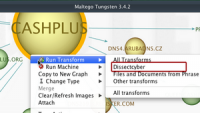-
Upgrading the U.S. grid

As society moves toward an increasingly connected world, keeping the U.S. electrical grid reliable and safe from hackers and other potential security threats has perhaps never been more crucial. The Department of Energy’s Grid Modernization Initiative aims to deliver fundamental knowledge, new concepts, tools and data to support the nation’s journey to modernizing the electric power system infrastructure. Enhanced grid security, grid flexibility via energy storage and improved economic competitiveness are key outcomes of this initiative.
-
-
AgTech innovator raises $7.5 million to help develop precision agriculture
Today, the Ag industry loses more than $300 billion each year due to crop diseases and pests. Pests and diseases can destroy crops and devastate farmers’ agricultural yield, but chemical overuse comes with its own set of challenges, including pesticide-resistant disease strains. Meanwhile, rising temperatures and increasing levels of carbon dioxide create more challenges for farmers as crop pests and disease thrive in hot, CO2-rich environments. Taranis, a precision agriculture intelligence platform, announced it has closed a $7.5 million Series A round of financing. Taranis says it aims to lead the digital farming revolution by giving farmers around the globe the ability to predict and prevent detrimental threats to their crops—and bottom line.
-
-
Dissect Cyber notifies small businesses targeted by cybercriminals

Cybercriminals are an insidious lot, constantly launching new schemes to steal money from individuals and companies. In the United States, millions of people and small businesses fall victim to internet crimes each year. Most small businesses do not have ready access to timely cybersecurity notifications of possible threats.
-
-
Growing significance of cryptocurrencies

While many members of the general public may have heard of “bitcoin,” the first decentralized cryptocurrency launched in 2009, a new report paints a broader picture of “cryptocurrencies.” More than three million people (three times previous estimates) are estimated to be actively using cryptocurrencies like bitcoin, finds the first global cryptocurrency benchmarking study.
-
-
Europe’s economy vulnerable to global water scarcity, drought
A new study of the impacts that increasing water scarcity and drought may have on the European Union’s (EU) economy finds that around 38 percent of the EU’s water demand lies outside its borders because many of the goods consumed by its citizens or used by its businesses are produced abroad. “The highest risk that the European meat and dairy sector will face due to climate change and weather extremes lies outside its borders. This is because it is highly dependent on soybean imports from locations that are vulnerable to water scarcity and drought,” says one expert.
-
-
Rewriting NAFTA has serious implications beyond just trade
President Donald J. Trump has called the North American Free Trade Agreement (NAFTA) our “worst trade deal.” After flip-flopping between scrapping NAFTA altogether and saying that the agreement required only tweaks, Trump is trying to force a renegotiation of a deal that supports three million American jobs. This may seem like just another trade dispute, but NAFTA has bound together North America’s economic and security considerations. The renegotiation of NAFTA may thus have serious implications not only for trade and the continental economy, but also for immigration and border security. Bad deal or not, NAFTA has fundamentally reshaped North America’s immigration and security policies. Any changes to NAFTA will certainly have repercussions that reach far beyond the economy.
-
-
Differentiating viral and bacterial infections

MeMed, an Israeli company specializing in molecular immunology, informatics, clinical infectious diseases and in vitro diagnostics, last week announced it has been awarded a $9.2 million contract by DoD’s Defense Threat Reduction Agency (DTRA) to fund the completion of MeMed’s point-of-care platform for distinguishing bacterial from viral infections.
-
-
Timber skyscrapers may soon transform London’s skyline
The use of timber as a structural material in tall buildings is an area of emerging interest for its variety of potential benefits; the most obvious being that it is a renewable resource, unlike prevailing construction methods which use concrete and steel. The research is also investigating other potential benefits, such as reduced costs and improved construction timescales, increased fire resistance, and significant reduction in the overall weight of buildings. London’s first timber skyscraper could be a step closer to reality as city engineers are finalizing their evaluation of a conceptual plans for an 80-storey, 300-meter high wooden building integrated within the Barbican.
-
-
Populism, terrorism converge to compound global risks
Aon publishes 2017 Risk Maps for Political Risk, Terrorism and Political Violence shows there has been a 14 percent increase in the number of terrorist attacks worldwide in 2016, up to 4,151 from 3,633 in 2015. Western countries saw a 174 percent increase in terrorist attacks in 2016, up from 35 attacks in 2015 to 96 attacks in 2016. Oil and gas companies were the target of 41 percent of terrorist attacks on commercial interests in 2016 and the trend has continued in 2017. But 2017 marks the first year in the last four where as many countries experienced a decline in political risk for investors as those experiencing an increase. This suggests a modest improvement in economic resilience after many years of deterioration. The potential for divergence between the United States and Europe around sanctions regimes could create uncertainty for investors in Iran, Russia, and even Cuba.
-
-
BP oil spill did $17.2 billion in damage to natural resources

The 2010 BP Deepwater Horizon oil spill did $17.2 billion in damage to the natural resources in the Gulf of Mexico, a team of scientists recently found after a six-year study of the impact of the largest oil spill in U.S. history. This is the first comprehensive appraisal of the financial value of the natural resources damaged by the 134-million-gallon spill.
-
-
Clean power planning

With a single executive order issued at the end of March, the Trump administration launched a robust effort to roll back Obama-era climate policies designed to reduce U.S. carbon dioxide (CO2) emissions. Chief among those policies is the Clean Power Plan, which targets coal and natural gas-fired electric power plants that account for about 40 percent of the nation’s CO2 emissions. Private and public-sector investors may see the executive order as a green light to double down on relatively cheap fossil fuels and reduce holdings in more costly, climate-friendly, non-carbon generation technologies such as wind, solar and nuclear. But they may want to think twice before making such transactions – and a new study details why it’s prudent to invest in carbon-free electricity now.
-
-
U.S. considering major changes to Visa Waiver program

Secretary of Homeland Security John Kelly said the Trump administration is considering making changes to the Visa Waiver Program (VWP), making it harder for Europeans travelling to the United States. Kelly said the existing rules, which do not require citizens of thirty-eight countries to get a visa for a trip of less than three months to the United States, should be re-evaluated in light of concerns about terrorism. “We have to start looking very hard at that [visa waiver] program,” he said.
-
-
How will the federal government protect nuclear safety in an anti-regulatory climate?

The Trump administration and congressional Republicans have undertaken a wide-ranging effort to shrink the federal government’s regulatory footprint. Much attention has focused on high-profile targets, such as the Environmental Protection Agency. But this trend also has major implications for other agencies. One example is the U.S. Nuclear Regulatory Commission (NRC), which oversees safety across a complex, privately owned network of nuclear power plants, used fuel storage facilities and other sites related to civilian uses of nuclear energy. The NRC and the system it regulates exemplify what some scholars call a “high reliability organization” – one that cannot be allowed to fail, because the consequences would be grave (two examples of failures of external oversight: Chernobyl in 1986 and Fukushima in 2011). A high reliability organization is not automatically a highly reliable organization. Reliability is an ongoing accomplishment involving continuous learning, sustained vigilance and a strong system of checks and balances. Moving forward in an anti-regulatory climate, with so many complex challenges facing the agency, it is essential to ensure independent leadership, public transparency and adequate resources to support the NRC’s mission.
-
-
U.S. companies performed 18 percent of R&D outside the United States
U.S. companies spent $73 billion on research and development (R&D) performed outside the United States in 2013, according to a new report by the National Science Foundation’s National Center for Science and Engineering Statistics. The total represented 18 percent of U.S. companies’ total R&D performance. These same companies spent $323 billion on R&D performed within the United States in 2013. Four industries accounted for 52 percent of foreign R&D performance by U.S. companies.
-
-
Sustainability’s threat to fossil fuel industry is only going to increase
Commercial activity in fossil fuels is increasingly at odds with global actions to reduce the threat of climate change. Burning coal, oil, and natural gas is responsible for two-thirds of humanity’s emissions of greenhouse gases, and yet provides more than 20 percent of GDP in two dozen nation states. By Citicorp’s estimate, current commitments to reduce these emissions could mean forgoing $100 trillion in fossil fuel revenues by 2050 — representing a huge disruption to global affairs, undermining national budgets and corporate balance sheets while exposing stakeholders, including pension holders and ordinary citizens in resource-exporting states, to myriad risks.
-
More headlines
The long view
If Trump Wants More Deportations, He’ll Need to Target the Construction Industry
As President Donald Trump sends mixed messages about immigration enforcement, ordering new raids on farms and hotels just days after saying he wouldn’t target those industries, he has hardly mentioned the industry that employs the most immigrant laborers: construction. Almost a quarter of all immigrants without a college degree work in construction.
Federal R&D Funding Boosts Productivity for the Whole Economy − Making Big Cuts to Such Government Spending Unwise
Large cuts to government-funded research and development can endanger American innovation – and the vital productivity gains it supports. If the government were to abandon its long-standing practice of investing in R&D, it would significantly slow the pace of U.S. innovation and economic growth.
Smaller Nuclear Reactors Spark Renewed Interest in a Once-Shunned Energy Source
In the past two years, half the states have taken action to promote nuclear power, from creating nuclear task forces to integrating nuclear into long-term energy plans.
